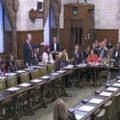
Ministerial answers to parliamentary questions over progress in resolving the cladding crisis in private blocks of flats are seriously misleading if not outright wrong, according to the Leasehold Knowledge Partnership.
Although ministers have given these answers, they are drafted, of course, by the many officials now working on “building safety”.
Why are ministers being told – and repeating in Parliament – that there have been no gagging clauses in contracts to remediate sites when there clearly have been (see below)?
Why are officials telling ministers that there is no requirement in order to obtain government funding for section 20 consultations – which means leaseholders accept total liability to remediate the cladding – when there clearly has been?
Why has Parliament been told that the data on the money spent would be produced “in time”, when officials already know that very little, if any, has been spent?
Something seems very wrong. We are now at a stage where the whole sector is worried about the government approach and the lack of progress.
Leaseholders face the anguish of living in a block of flats with dangerous cladding; they face financial ruin paying for the waking watch; their lives are on hold as they cannot sell their homes; and they have no idea when this nightmare will end.
As a result, over the last few weeks MPs have asked a series of written parliamentary questions.
The Minister’s replies seem to raise a number of very serious questions about the information being provided to Minister by officials.
Don’t speak to the press
Buildings: Insulation: 28 Jan 2020: Hansard Written Answers – TheyWorkForYou
To ask the Secretary of State for Housing, Communities and Local Government, whether the standard private sector ACM remediation contracts agreed with the responsible entity for each site includes clauses that (a) relate to comments on government policy and (b) seek recovery of monies from the leaseholders; and if he will place a copy the standard contract in the Library.
Hilary Benn MP: To ask the Secretary of State for Housing, Communities and Local Government, whether the standard private sector ACM remediation contracts agreed with the responsible entity for each site includes clauses that (a) relate to comments on government policy and (b) seek recovery of monies from the leaseholders; and if he will place a copy the standard contract in the Library.
The Minister replied:
“There are no provisions within the private sector ACM remediation funding agreement which affect applicants’ ability to comment on government policy. The private sector remediation fund will protect leaseholders from bearing the cost of remediation, and there are clauses within the funding agreement to ensure this.”
This seems very odd as the Leasehold Knowledge Partnership is in possession of contracts which say:
“The Applicant shall not make any communication to the press or any journalist or broadcaster regarding the Project or the Agreement (or the performance of it by any Party) without the prior written approval …”
How much has been paid out to cladding sites?
Buildings: Insulation: 27 Jan 2020: Hansard Written Answers – TheyWorkForYou
To ask the Secretary of State for Housing, Communities and Local Government, how much has been paid out from the ACM private sector remediation fund for cladding replacement as 21 January 2020.
Hilary Benn MP: To ask the Secretary of State for Housing, Communities and Local Government, how much has been paid out from the ACM private sector remediation fund for cladding replacement as 21 January 2020.
The Minister replied:
“This will be reported in future Building Safety Programme data releases.”
This may be a technically correct answer, but also seems very odd to the Leasehold Knowledge Partnership as we are informed by the Greater London Authority, which is expected to administer £150 million of the £200 million ACM remediation fund for private cladding blocks, has at present paid nothing.
That is … nothing after eight months since the fund was launched and a month since applications were officially meant to close. LKP understands applications continue to be processed, but nobody has any idea when the funding will close and what will happen in the sites where no application has been made
Do leaseholders have to accept they are liable for the cladding costs before the government pays up?
Buildings: Insulation: 22 Jan 2020: Hansard Written Answers – TheyWorkForYou
The private sector remediation fund will protect leaseholders from bearing the cost of remediation of unsafe ACM cladding. Applicants to the fund are not required to carry out a section 20 consultation with leaseholders. Applicants should take their own legal advice on this.
Hilary Benn MP: To ask the Secretary of State for Housing, Communities and Local Government, whether the Government requires each responsible entity to follow a section 20 procurement process under the 1985 Landlord and Tenant Act in relation to cladding remediation; and what guidance his Department has issued to those entities on the requirement for that process.
The Minister replied
“The private sector remediation fund will protect leaseholders from bearing the cost of remediation of unsafe ACM cladding. Applicants to the fund are not required to carry out a section 20 consultation with leaseholders. Applicants should take their own legal advice on this.”
This seems very odd to LKP as we have seen GLA letters which advise:
“Firstly, to satisfy eligibility requirements and to protect leaseholders: The Fund is designed so that leaseholders are the beneficiaries in that any costs they would incur through the service charge mechanism are met by the Fund.”
In short, for leaseholders’ application to be eligible, they are required to accept the liability of meeting the cost of the unsafe ACM cladding remediation.
Legally, of course, unless landlords undertake a section 20 consolation they would not be able to recover the costs from leaseholders.
But why is government funding to these blocks operating through the service charge? If a block is valued at zero – as these are – then the freehold is worth nothing as well as the flats.
The freehold could be transferred as a condition of government grant funding, thereby removing the irrelevant and often offshore landlord from the resolution of this crisis.
For the remediation fund to work through the service charge mechanism, leaseholders need to be made liable for the cost of the remediation and only in those circumstances will the application be eligible.
Great … if the remediation fund DOES actually pay the full costs to remove the cladding. Potentially disastrous if some elements – waking watch, say? – are excluded from the grant.
“Secondly, to ensure the responsible entity either meets costs outside the scope of the Fund or recovers those costs where appropriate.
“While there is no limit on state aid funding that a private individual can receive, De Minimis State Aid rules do apply an upper limit on the amount of state aid funding that a commercial undertaking can receive.
“This means that any commercial leaseholders, or any private individuals, that generate an income from their leasehold unit (ie renting it out) will be considered a commercial undertaking and can only receive a maximum of €200,000 (euros).
“Where any of these circumstances exist, any costs incurred by that commercial undertaking (ie the proportion of project costs to that undertaking that are above the €200,000 limit) will not be met by the Fund.
“And, as above, if a section 20 consultation has not been undertaken, it would again be impossible for the responsible entity to recover those costs through the service charge mechanism. (And therefore the responsible entity – the freeholder – would need to meet those costs which would ordinary be recovered through service charge.)
Have Ministers met with leaseholders?
Buildings: Insulation: 3 Feb 2020: Hansard Written Answers – TheyWorkForYou
To ask the Secretary of State for Housing, Communities and Local Government, pursuant to the Answer of 23 January 2020, to Question 5437, on Buildings: Insulation, how many groups of affected leaseholders (a) he and (b) his Ministers have met to discuss the remediation of unsafe cladding on their blocks.
Steve Reed MP: To ask the Secretary of State for Housing, Communities and Local Government, pursuant to the Answer of 23 January 2020, to Question 5437, on Buildings: Insulation, how many groups of affected leaseholders (a) he and (b) his Ministers have met to discuss the remediation of unsafe cladding on their blocks.
The Minister replied:
“Ministers and officials from the Department have had regular correspondence and engagement with numerous leaseholders living in buildings with unsafe cladding, and we are aware of the concerns they have.
“The Government’s priority is to ensure that unsafe ACM cladding is removed and replaced swiftly so that residents may be and feel safe in their homes. My Department have engaged with a named contact for each building to ensure progress is being made.”
Many cladding leaseholders have told LKP they have been left in the dark and have had no contact with Ministers and little contact from officials.





 Brexit day prisoner: Polish father desperate to sell Notting Hill Genesis cladding flat to join ailing family back home
Brexit day prisoner: Polish father desperate to sell Notting Hill Genesis cladding flat to join ailing family back home





















